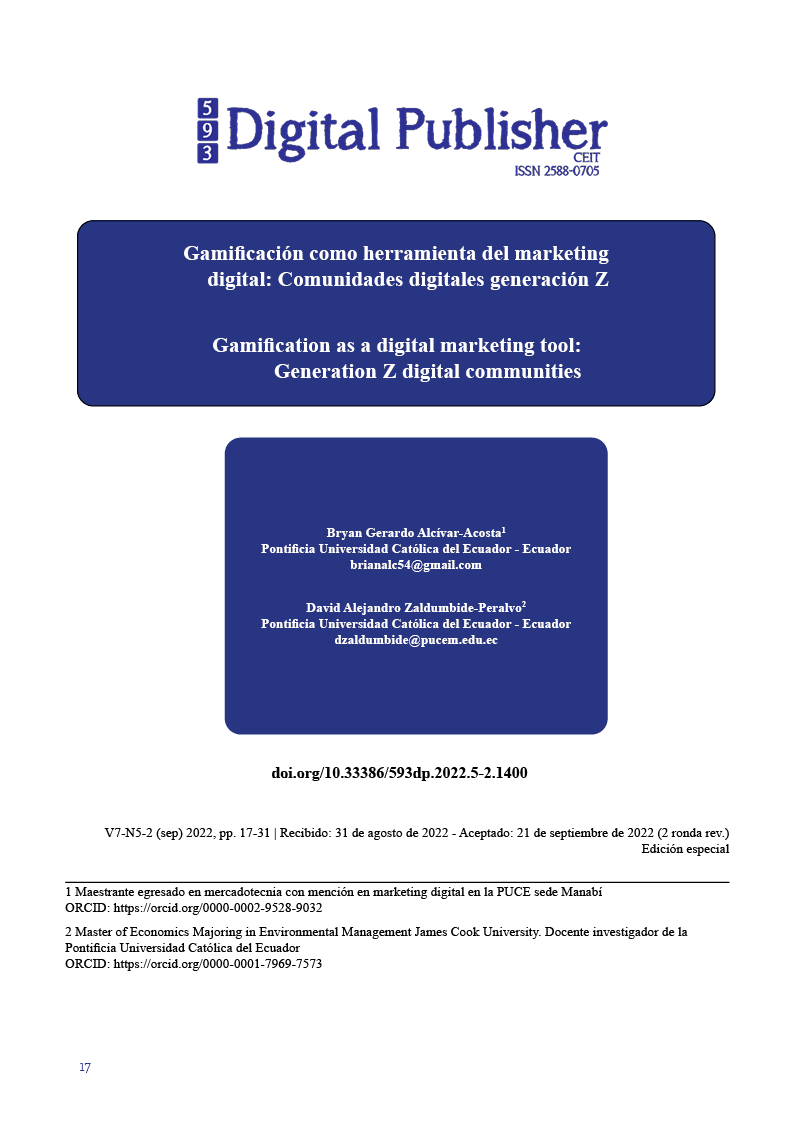Gamification as a digital marketing tool: Generation Z digital communities
Main Article Content
Abstract
Society is saturated with so much information and users need an incentive that can awaken their interest and desire to know something beyond a good or service. Currently, although all companies are presented as capable of satisfying our needs, consumers opt for that brand that presents an added value, generating engagement. This is where gamification comes in as a tool that offersand enhances motivation and gives experiences to users belonging to generation Z through features of games applied in four stages: attraction, interaction, retention, and monetization.
Therefore, this research used the interview with experts to obtain relevant information about the benefits of gamification as a tool and how it can be coupled in a digital marketing strategy, and then through the Discord instrument, structure a proposal of a gamified community with the purpose of fulfilling the first two stages (attraction and interaction) aimed at generation Z of the PUCE Manabí, ending with a focus group within the gamified server managing to evaluate the behavior of people belonging to generation Z of the PUCE Manabí.
It was possible to implement a gamification strategy as a digital marketing tool aimed at Generation Z of the PUCE Manabí through the creation of communities in Discord. Therefore, gamification when using game features allows to increase user participation by motivating and granting experiences.
Downloads
Article Details

This work is licensed under a Creative Commons Attribution-NonCommercial-ShareAlike 4.0 International License.
1. Derechos de autor
Las obras que se publican en 593 Digital Publisher CEIT están sujetas a los siguientes términos:
1.1. 593 Digital Publisher CEIT, conserva los derechos patrimoniales (copyright) de las obras publicadas, favorece y permite la reutilización de las mismas bajo la licencia Licencia Creative Commons 4.0 de Reconocimiento-NoComercial-CompartirIgual 4.0, por lo cual se pueden copiar, usar, difundir, transmitir y exponer públicamente, siempre que:
1.1.a. Se cite la autoría y fuente original de su publicación (revista, editorial, URL).
1.1.b. No se usen para fines comerciales u onerosos.
1.1.c. Se mencione la existencia y especificaciones de esta licencia de uso.
References
Ciucci, L. (2016). Trabajo de Tesis para optar al título de Magister Gamificación: alcances y perspectivas en la ciudad de La Plata. Universidad Nacional de la Plata.
Conaway, R., & Garay, M. C. (2014). Gamification and service marketing. SpringerPlus, 3(1). https://doi.org/10.1186/2193-1801-3-653
Fernández, T. (2022). Primeros pasos en Discord: qué es, cómo registrarte y cómo crear o acceder a sus servidores. Xataka. https://www.xataka.com/basics/primeros-pasos-discord-que-como-registrarte-como-crear-acceder-a-sus-servidores
Jang, Y. T., & Hsieh, P. S. (2021). Understanding consumer behavior in the multimedia context: incorporating gamification in VR-enhanced web system for tourism e-commerce. Multimedia Tools and Applications, 80(19), 29339–29365. https://doi.org/10.1007/s11042-021-11149-8
Lisboa, R. (2019). ¿Qué es un focus group o grupo focal y para qué sirve? Rockcontent. https://rockcontent.com/es/blog/focus-group/
Mateus, J., & Ortegón, J. (2019). Gamificación en el ámbito educativo y de marketing. TIA (Tecnología, Investigación y Academía), 7(1), 11–15.
Milanesi, M., Guercini, S., & Runfola, A. (2022). Let’s play! Gamification as a marketing tool to deliver a digital luxury experience. Electronic Commerce Research, 1–18. https://doi.org/10.1007/S10660-021-09529-1/FIGURES/1
Ming-Hui Wen, D., Jen-Wei Chang, D., Lin, Y.-T., Liang, C.-W., & Yang, S.-Y. (2014). Gamification Design for Increasing Customer Purchase Intention in a Mobile Marketing Campaign App. In LNCS (Vol. 8527).
París, J. A. (2020). La Muerte de las Marcas en Manos de los Nativos Digitales. Ciencias Administrativas, 18, 085. https://doi.org/10.24215/23143738e085
Salinas, J. (2003). Comunidades Virtuales y Aprendizaje Digital.
Sánchez, F. (2019). Guía de tesis y proyectos de investigación. In F. Sánchez (Ed.), Julio (Primera, Vol. 1, Issue 054). 2019. www.aacentrum.com
Thorpe, A. S., & Roper, S. (2019). The Ethics of Gamification in a Marketing Context. Journal of Business Ethics, 155(2), 597–609. https://doi.org/10.1007/s10551-017-3501-y
Universidad San Sebastian. (2019). Entrevista con expertos. https://www.uss.cl/diee/innovakit/entrevista-con-expertos/



